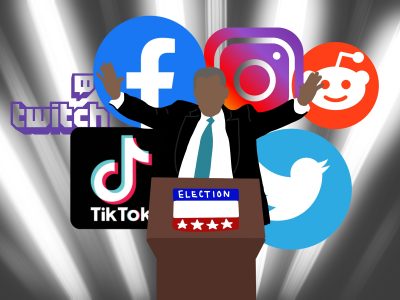Florida Representative Matt Gaetz started a live-stream last Thursday on Twitch, a live-video streaming platform popular for gaming and “just chatting” with influencers. His inaugural 30-minute stream was primarily the representative talking through his opinions on abortion and police funding. The stream had only six concurrent viewers at its peak.
Comparatively, New York Representative Alexandria Ocasio-Cortez started a Twitch stream in October of 2020, and gained 439 thousand concurrent viewers at the peak of her three hour stream.
These two politicians received wildly different outcomes to their live-streaming debuts, and it reflects a disconnect between young voters and their so-called representatives. Politicians, companies and advertisers are all eager to reach young people through the internet, but the response from young people always seems unpredictable.
The popular consensus when it comes to Gen Z informatics is that they are always online, and they care about other people and things that are always online. The reality is much more nuanced than that, and Gaetz’s stream last Thursday is a microcosm of that misconception.
When talking to political consultants, many actually say that social media presence isn’t actually the secret to securing the young voter. Consultants who have talked to members of our editorial board pointed to grassroots campaigns, specifically presence on college campuses and young people working peer-to-peer on behalf of the campaign.
What matters above all, when engaging in political content, is of course, political issues. Issues which are not formed by proximity to the internet, but in fact the opposite. What matters most to us are typically the things that we experience in our day-to-day life. Social media consumption could affect that, but person-to-person interactions are going to play a much greater role.
Gaetz’s misfire on Twitch also comes from a lack of understanding why young people engage on the platforms that they do. While Twitter and Facebook are more commonly used by the politically engaged, most people on Twitch aren’t looking for political content, especially not from politicians themselves.

It’s worth noting that the majority of Ocasio-Cortez’s stream was spent simply playing popular video game Among Us, with the occasional break to motivate people to vote in the November elections. Sure, she was delivering a political message, but it was non-controversial and took the backseat to gaming alongside notable Twitch streamers.
If public figures want to use social media effectively, they have to use each platform for the purpose they were intended for. Twitch users come to the platform to watch relatable speakers play video games, so Matt Gaetz going over rehearsed talking points was doomed for failure.
Following gaming or Tik Tok trends to a T isn’t necessary, but public figures need to at least meet platforms halfway. If there’s one thing that is for certain, Gen Z will ridicule you if you reveal you can’t understand how to use the internet properly.
It also doesn’t help that the Florida representative is currently under investigation for child sex trafficking. Gaetz allowed people to continue to chat after the stream had gone offline, a common practice to encourage community building in streamer’s fanbases, but it wasn’t long before the chat log became flooded with strongly worded messages on the topic of Gaetz’s trafficking investigation.
Politicians joining different social media is ultimately a good thing, as it allows them to engage more easily with their constituents, but engaging properly is not as simple as just “being on Twitch.”
This editorial was written by Opinion Editor Maxwell Pociask.














